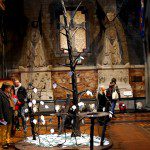 I just came across this story from early May about a lecture given by Pulitzer Prize winning geography professor Jared Diamond titled “The Evolution and Function of Human Religion.” Diamond is best known for his books Guns, Germs, and Steel: The Fates of Human Societies and Collapse: How Societies Choose to Fail or Succeed. He’s demonstrated a brilliant insight into human behavior and if he has thoughts on the evolution of religion I thought I’d like to hear them.
I just came across this story from early May about a lecture given by Pulitzer Prize winning geography professor Jared Diamond titled “The Evolution and Function of Human Religion.” Diamond is best known for his books Guns, Germs, and Steel: The Fates of Human Societies and Collapse: How Societies Choose to Fail or Succeed. He’s demonstrated a brilliant insight into human behavior and if he has thoughts on the evolution of religion I thought I’d like to hear them.
Ever since I realized Genesis is not literally true I’ve wondered about the origins of religion. Humans are the only animals with religion – it had to arise somewhere in our evolutionary history. As non-theistic anthropologists like to point out, religion is costly – if it didn’t provide an evolutionary advantage, it would have died out long ago. But it hasn’t, so it must provide some tangible benefits.
Diamond lists six benefits of religion:
- Explaining the natural world, absent scientific understanding of the universe.
- Diffusing anxiety over dangers beyond human control.
- Providing comfort in the face of pain, suffering and mortality.
- Teaching obedience toward political leaders.
- Teaching peaceful behavior toward strangers within one’s own society.
- Justifying killing enemies from other societies.
This list isn’t bad, but it’s not particularly original – I’ve seen variations on it from other sources. It lacks “building group identity and cohesion” which is frequently cited as the primary non-theistic driver of religion. And by Diamond’s own admission, the final three items are unique to the relatively modern organized religions – they are not present in tribal religions, and #4 and #6 are in decline in the liberal religions.
There are two serious problems with the list, though. The first is the idea that religion evolved to “explain the natural world, absent scientific understanding of the universe.” When we read stories of Apollo driving the sun across the sky in a chariot or Ra traversing the perils of the underworld each night to bring the sun back to the east, we are reading myths – stories people told themselves to give their world meaning and structure. To imply the ancients thought they were literally true because they didn’t have “proper” science is an ethnocentric insult.
Look at the precision with which the pyramids are laid out. Look at the stellar alignments at Göbekli Tepe. Look at the midwinter sunrise at Newgrange. These were sophisticated people with exactly the same brainpower we have – they understood the natural world quite well. But unlike many of us, they didn’t try to convince themselves that literal truth is the only truth.
But what’s really missing from this list is anything resembling religious experience. Christianity as we know it began with Paul’s Damascus Road experience of Jesus. Islam began when the angel Gabriel appeared to Muhammad. Buddhism began when Siddhartha Gautama sat under the Bodhi tree until he received enlightenment and became the Buddha.
The traditional religions Diamond supposedly knows so well from his “decades-long work with tribal cultures of New Guinea” are based on the near-constant experience of ancestors and spirits, with customs and rituals designed to keep people in right relationship with them.
Experience, experience, experience.
It is possible to study religion and its origins and only consider non-theistic hypotheses. It can’t be done particularly well, but it can be done. But it is impossible to make even a half-hearted attempt to explain the origins and evolution of religion without considering the impact of the interaction of humans with Gods and spirits. Call them “numinous forces” if you can’t bring yourself to even consider the existence of Gods and spirits, but at the very least academic integrity demands that a researcher pay serious attention to what the objects of said research actually say they’re doing.
There’s a lot we can learn from Jared Diamond here – it’s just not what he intended to teach.
It’s hard to study something you don’t believe is real. Now, we all know religion is real – drive down the street or turn on the TV and you can see it. But there’s a difference between recognizing something exists and accepting that people find meaning and power in it. We need not accept every faith claim of every religion to understand there’s something to it, even if a dispassionate dissection can’t quite figure out what it is.
A quote alternative attributed to Confucius and George Bernard Shaw (both incorrectly) says “people who say it cannot be done should not interrupt those who are doing it.” If you want to understand the origins of religion, to go talk to someone who’s having a religious experience. Or better yet, go talk to someone who can show you how to have one of your own. The Gods move according to Their own desires and we cannot command Them to appear for our amusement (or even for our education), but there are practices, rituals, and techniques that have been shown to be quite helpful in facilitating communication between humans and spirits.
Our mainstream culture tells us religion is all about what we believe. There’s a place for belief in modern Paganism and polytheism, but that place comes after experience. Meet the Gods. Meet the ancestors. Meet the spirits of the land where you are. Feel their presence. Listen to them speak – sometimes in words, other times in feelings and impressions. Experience them for yourself. Then, when it’s over, you can start to think about what you believe about it.
Even after you’ve had time to start forming beliefs, resist the urge to cut open the goose that laid the golden eggs. Remember the words of chaos magician Peter Carroll: “magic works in practice but not in theory.” Religious theory helps us locate our practices and beliefs within the wider world, but it is not necessary to “prove” it’s real.
Our proof comes in living our lives: does our religion help us live fuller, more meaningful lives? Does it help us form and strengthen connections with other people, other tribes, and other species? Does it help us draw close to the Gods and to Their virtues and values?
So yes, if you want to investigate the origins of religion, you can dispassionately dissect all the worlds’ religion, distill it down and see what remains. You’ll find something… whether it’s meaningful or not remains to be seen. But if you really want to understand the origins of religion, begin with the reality of religious experience.
















